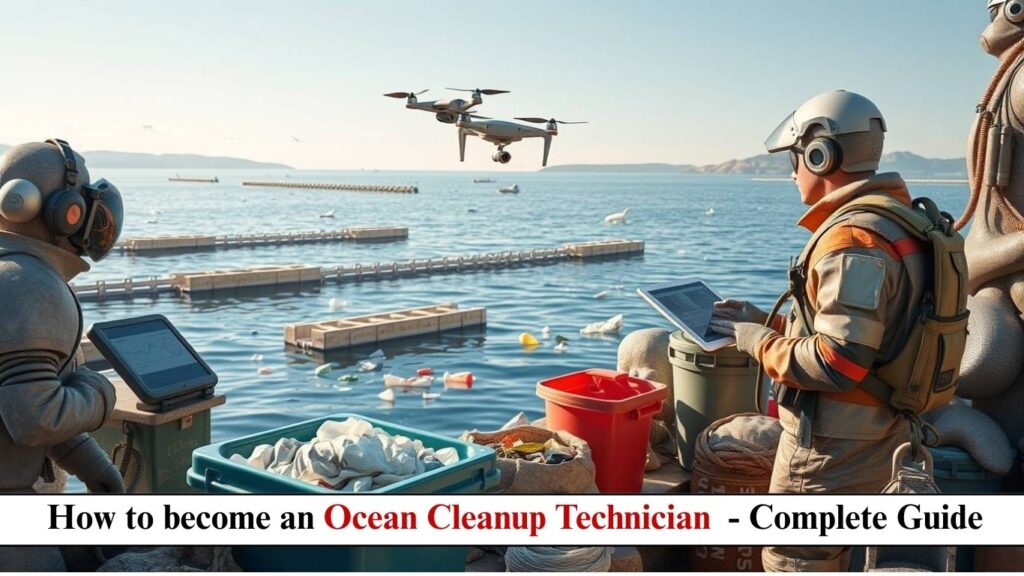
Introduction
The world’s oceans are drowning in plastic pollution, with 8 million tons of waste entering the seas every year. Ocean Cleanup Technicians are the frontline warriors fighting this crisis by removing debris, restoring marine ecosystems, and developing sustainable solutions.
This blog covers everything you need to know about becoming an Ocean Cleanup Technician, including:
- History of ocean cleanup efforts
- Salary expectations
- Roles and responsibilities
- Required qualifications
- How to get started
- Future career scope
If you’re passionate about marine conservation, this guide will help you turn that passion into a rewarding green career.
History of Ocean Cleanup Efforts
Ocean pollution became a global concern in the mid-20th century when plastic production surged. By the 1970s, scientists began documenting plastic waste in marine ecosystems, leading to early cleanup initiatives.
Key milestones:
- 1972: The London Convention regulated ocean dumping.
- 1997: The Great Pacific Garbage Patch was discovered, sparking urgency for cleanup.
- 2013: Boyan Slat founded The Ocean Cleanup, pioneering large-scale cleanup technology.
- 2020s: Governments and NGOs invest billions in marine cleanup projects, creating new job opportunities.
Today, Ocean Cleanup Technicians work with nonprofits, research teams, and government agencies to combat ocean pollution.
Ocean Cleanup Technician Salary
Salaries vary by experience, location, and employer, but here’s a general breakdown:
| Experience Level | Average Salary (USD) | Salary Range (USD) |
|---|---|---|
| Entry-Level (0-3 years) | $35,000 – $50,000 | $30,000 – $60,000 |
| Mid-Level (4-7 years) | $50,000 – $75,000 | $45,000 – $85,000 |
| Senior-Level (8+ years) | $80,000 – $120,000+ | $70,000 – $150,000+ |
Highest-Paying Sectors
- Government & Environmental Agencies (NOAA, UNEP)
- Nonprofits (The Ocean Cleanup, Ocean Conservancy)
- Private Sector (Waste management companies, eco-tech startups)
Top-Paying Countries
- USA, Canada, Australia, Norway, Netherlands
Roles & Responsibilities of an Ocean Cleanup Technician
An Ocean Cleanup Technician’s job involves hands-on cleanup, research, and technology development. Key responsibilities include:
1. Field Operations
- Deploying cleanup systems (boats, drones, nets).
- Collecting and sorting marine debris.
- Conducting beach cleanup drives.
2. Data Collection & Analysis
- Tracking plastic pollution levels.
- Using GIS and remote sensing to map waste hotspots.
3. Equipment Maintenance
- Repairing cleanup vessels and machinery.
- Testing new pollution capture devices.
4. Community & Policy Engagement
- Educating the public on marine conservation.
- Assisting in policy-making for ocean protection.
5. Research & Innovation
- Working with scientists to develop biodegradable materials.
- Improving recycling and waste management systems.
Qualifications Required to Become an Ocean Cleanup Technician
1. Educational Background
- High School Diploma (for entry-level fieldwork).
- Bachelor’s Degree (preferred in):
- Marine Biology
- Environmental Science
- Oceanography
- Mechanical Engineering (for tech-focused roles)
2. Key Skills
- Technical Skills:
- Boating/SCUBA certification
- Knowledge of waste management systems
- Data analysis (GIS, Excel)
- Soft Skills:
- Physical stamina (for fieldwork)
- Teamwork & problem-solving
3. Certifications (Helpful for Career Growth)
- PADI SCUBA Diving Certification
- OSHA Safety Training
- Marine Debris Tracker Certification
How to Get Started as an Ocean Cleanup Technician
1. Gain Relevant Education & Training
- Enroll in marine science or environmental programs.
- Take online courses (e.g., Coursera’s “Ocean Sustainability”).
2. Volunteer & Intern
- Join beach cleanups (Ocean Conservancy, Surfrider Foundation).
- Intern with marine research organizations.
3. Build Field Experience
- Work on fishing vessels or waste management crews.
- Assist in scientific expeditions (e.g., NOAA research ships).
4. Network & Apply for Jobs
- Attend marine conservation conferences.
- Follow job boards like ECO Canada & Idealist.
Future Scope of Ocean Cleanup Technicians
The demand for ocean cleanup professionals is rising fast due to:
1. Global Plastic Pollution Crisis
- By 2050, oceans could contain more plastic than fish (Ellen MacArthur Foundation).
- Governments are enforcing stricter anti-pollution laws.
2. Technological Advancements
- AI-powered cleanup drones.
- Floating barrier systems (like The Ocean Cleanup’s Interceptor).
3. Growing Green Job Market
- The blue economy is expected to double by 2030 (World Bank).
- Companies like Coca-Cola & Adidas fund cleanup initiatives.
4. International Career Opportunities
- Work with UNEP, Greenpeace, or WWF.
- Join startups developing ocean-cleaning tech.
Conclusion: Is Ocean Cleanup a Good Career?
Absolutely! If you love the ocean and sustainability, this career offers:
✔ Meaningful impact on the planet
✔ Growing job opportunities
✔ Adventure & fieldwork
Start by volunteering, gaining certifications, and networking. The fight against ocean pollution needs passionate professionals like you!
Would you like recommendations for specific organizations hiring ocean cleanup technicians? Let me know in the comments! 🌊♻️













Post Comment